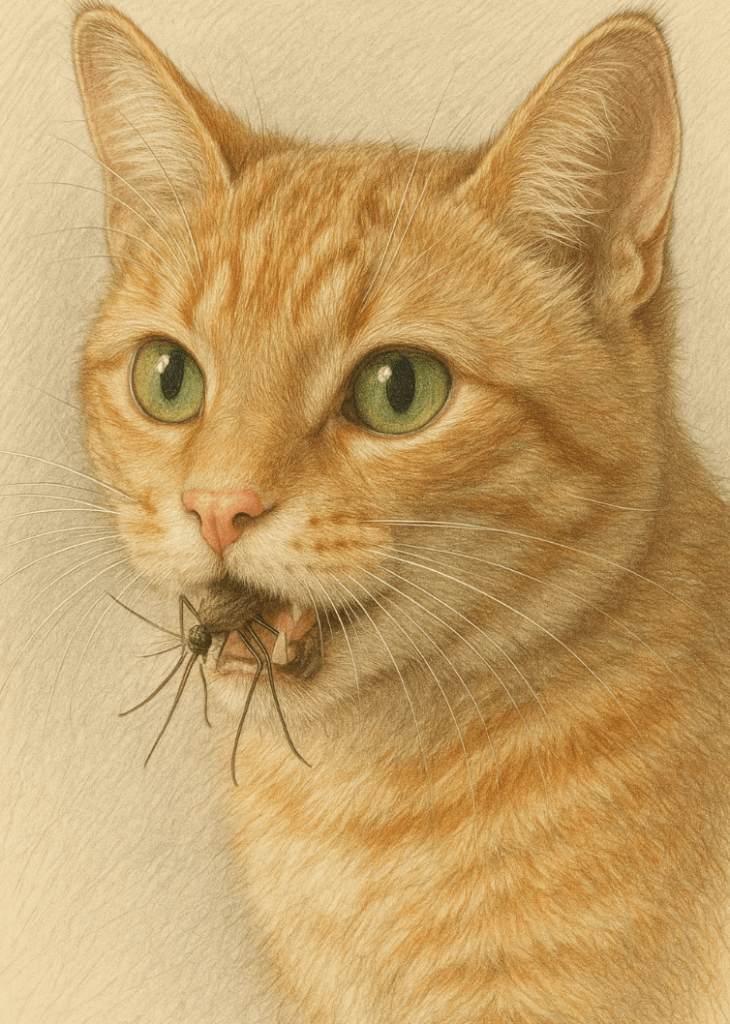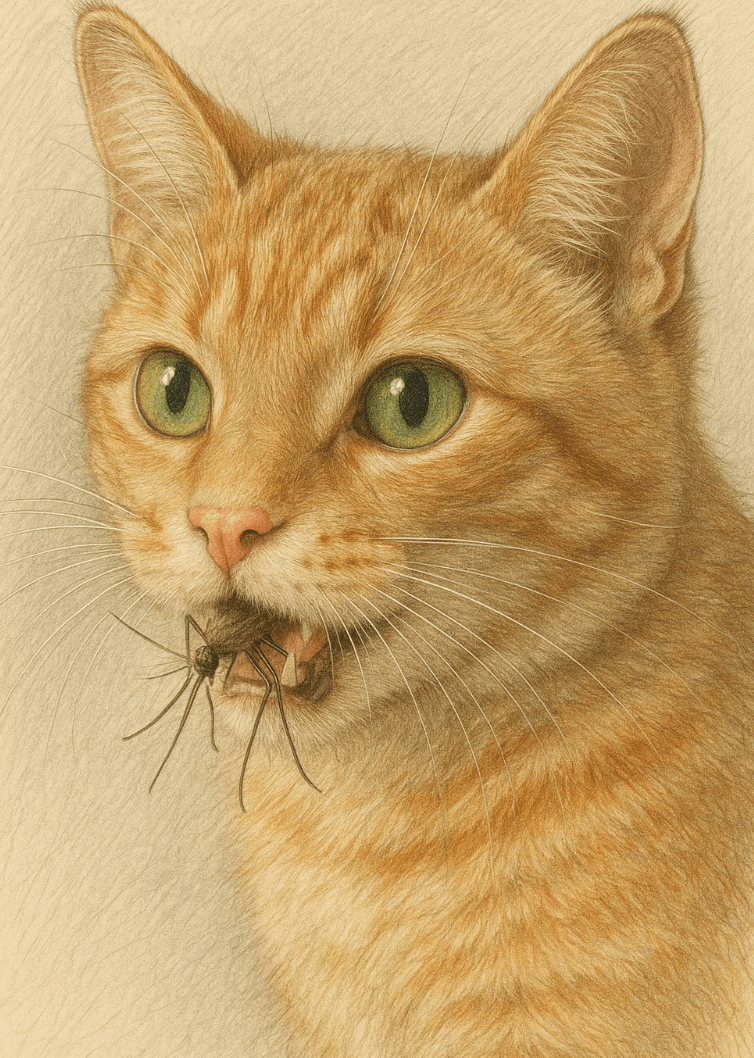Can Cats Eat Mosquitoes?
Cats are natural hunters, and their curious nature often leads them to chase and catch small creatures, including mosquitoes. While it might seem harmless—or even amusing—to watch your feline friend swat at or eat a mosquito, many pet owners wonder if this behavior is safe. Are mosquitoes a harmless snack for cats, or could they pose health risks? In this blog post, we’ll explore the topic in depth, examining whether cats can safely eat mosquitoes, potential dangers, and what you can do to keep your furry companion healthy.
Potential Risks of Cats Eating Mosquitoes
While mosquitoes may seem like tiny, insignificant creatures, they can carry diseases and parasites that might affect your cat’s health. Here are some risks associated with cats eating mosquitoes.
Transmission of Diseases:
Mosquitoes are known vectors for diseases like heartworm, which can infect cats and cause serious health issues.Parasitic Infections:
Some mosquitoes carry parasites that could harm your cat’s digestive system or overall well-being.Allergic Reactions:
Although rare, some cats may have allergic reactions to mosquito bites or ingestion, leading to swelling or discomfort.Toxins from Pesticides:
If mosquitoes have been exposed to insecticides or repellents, ingesting them could expose your cat to harmful chemicals.Choking Hazard:
Though unlikely, swallowing a mosquito whole could potentially cause choking, especially in kittens or older cats.
While the occasional mosquito snack is unlikely to harm your cat, these risks highlight the importance of monitoring their behavior and environment.
Benefits of Cats Eating Mosquitoes (If Any)
Believe it or not, there are a few minor benefits to cats catching and eating mosquitoes—though they come with caveats.
Instinctual Behavior:
Hunting mosquitoes satisfies your cat’s natural predatory instincts, providing mental stimulation and exercise.Pest Control:
By catching mosquitoes, your cat helps reduce the number of these pesky insects in your home or yard.Nutritional Value (Minimal):
While not a significant source of nutrition, mosquitoes do contain protein, which cats require in their diet.Bonding Opportunity:
Watching your cat hunt mosquitoes can be an entertaining and bonding experience, showcasing their agility and focus.Encourages Playfulness:
Chasing mosquitoes keeps your cat active and engaged, which is beneficial for their physical and mental health.
While these benefits exist, they don’t outweigh the potential risks, so it’s essential to remain cautious about your cat’s interactions with mosquitoes.
Check this guide 👉Can Cats Eat Brownies? Best 7 Expert Tips!
Check this guide 👉Can Cats Eat Baking Soda? Best 7 Expert Tips!
Check this guide 👉Can Cats Eat Gummy Bears? Best 7 Expert Tips!

Risks of Cats Eating Mosquitoes | Preventive Measures to Protect Your Cat |
|---|---|
Transmission of heartworm disease | Administer regular heartworm prevention medication |
Exposure to harmful pesticides | Avoid using chemical repellents around your home |
Potential allergic reactions | Monitor your cat for signs of swelling or itching |
Parasitic infections | Keep your cat indoors during peak mosquito hours |
Accidental ingestion of toxins | Use pet-safe insect control methods |
How to Prevent Your Cat from Eating Mosquitoes
If you’re concerned about your cat eating mosquitoes, there are several proactive steps you can take to minimize their exposure.
Keep Your Home Mosquito-Free:
Use pet-safe insect repellents and ensure windows and doors have proper screens to keep mosquitoes out.Limit Outdoor Time During Peak Hours:
Mosquitoes are most active during dawn and dusk, so keep your cat indoors during these times.Remove Standing Water:
Eliminate sources of standing water in your yard, as these are breeding grounds for mosquitoes.Use Natural Repellents:
Essential oils like citronella or eucalyptus can deter mosquitoes without harming your cat when used safely.Regular Veterinary Check-Ups:
Schedule routine vet visits to monitor your cat’s health and discuss preventive care options.
By taking these precautions, you can reduce the likelihood of your cat encountering mosquitoes and minimize any associated risks.
Signs Your Cat May Have Eaten a Harmful Mosquito
If your cat has eaten a mosquito, it’s important to watch for signs of adverse reactions or illness. These symptoms may indicate a problem requiring veterinary attention.
Vomiting or Diarrhea:
Digestive upset could signal an adverse reaction to something the mosquito carried.Lethargy or Weakness:
A sudden lack of energy might suggest your cat has ingested something harmful.Swelling or Redness:
Allergic reactions to mosquito bites or ingestion may cause visible swelling, particularly around the face or paws.Difficulty Breathing:
Labored breathing could indicate a severe allergic reaction or toxin exposure.Unusual Behavior:
Restlessness, pacing, or other abnormal behaviors might point to discomfort or distress.
If you notice any of these signs, contact your veterinarian promptly to ensure your cat receives appropriate care.
Common Misconceptions About Cats and Mosquitoes
There are several myths surrounding cats and mosquitoes that can lead to misunderstandings. Here’s what you need to know to separate fact from fiction.
Myth: Mosquitoes Can’t Harm Cats:
While rare, mosquitoes can transmit diseases like heartworm, making them a potential threat.Myth: Indoor Cats Are Completely Safe:
Even indoor cats can encounter mosquitoes, especially if windows or doors are left open.Myth: Cats Know What’s Safe to Eat:
Cats rely on instinct, but they can’t always distinguish harmful insects from harmless ones.Myth: Heartworm Only Affects Dogs:
Cats are also susceptible to heartworm, though symptoms may differ from those in dogs.Myth: Natural Repellents Are Always Safe:
Some natural repellents can be toxic to cats if not used correctly, so caution is essential.
Understanding these misconceptions helps you make informed decisions about your cat’s safety.
Health Conditions Linked to Mosquito Exposure in Cats
Mosquitoes can expose cats to various health conditions, some of which require immediate attention. Being aware of these risks allows you to act quickly if needed.
Heartworm Disease:
A serious condition caused by parasitic worms transmitted through mosquito bites; prevention is key.West Nile Virus:
Though rare in cats, mosquitoes carrying this virus can cause neurological symptoms.Allergic Dermatitis:
Mosquito bites can trigger skin irritation or allergic reactions in sensitive cats.Ingestion of Toxins:
Mosquitoes exposed to pesticides or chemicals may pass these toxins to your cat upon ingestion.Secondary Infections:
Scratching or biting at mosquito bites can lead to skin infections if not addressed promptly.
Proactive care and monitoring help mitigate these risks and keep your cat healthy.
Fun Facts About Cats and Their Hunting Instincts
Cats’ fascination with hunting mosquitoes stems from their innate predatory nature. Here are some intriguing facts about their hunting behavior.
Lightning-Fast Reflexes:
Cats can react to moving objects in as little as 50 milliseconds, making them excellent mosquito hunters.Sharp Vision in Low Light:
Cats’ eyes are adapted to low-light conditions, allowing them to spot mosquitoes even in dim environments.Whisker Sensitivity:
Their whiskers detect subtle air movements, helping them pinpoint the location of flying insects.Playful Practice:
Hunting mosquitoes provides cats with a way to practice their skills, even if they’re not hungry.Natural Pest Controllers:
Historically, cats have been valued for their ability to control pests, including insects and rodents.
These facts highlight the fascinating connection between cats and their instinctual drive to hunt.
Frequently Asked Questions About Cats and Mosquitoes
Is it normal for cats to eat mosquitoes?
Yes, it’s normal for cats to catch and eat mosquitoes due to their hunting instincts, but it’s not always safe.
Can mosquitoes give my cat heartworm?
Yes, mosquitoes can transmit heartworm to cats, so preventive medication is crucial.
What should I do if my cat eats a mosquito?
Monitor your cat for signs of illness, and consult your vet if you notice anything unusual.
Are indoor cats safe from mosquitoes?
While less likely, mosquitoes can still enter homes, so preventive measures are recommended.
How can I protect my cat from mosquitoes?
Keep your home mosquito-free, limit outdoor time during peak hours, and use pet-safe repellents.
Balancing Fun and Safety When It Comes to Cats and Mosquitoes
While it’s natural for cats to chase and eat mosquitoes, it’s important to weigh the fun and instinctual satisfaction against potential health risks. By understanding the dangers, taking preventive measures, and staying vigilant about your cat’s behavior, you can ensure their safety while allowing them to indulge their hunting instincts. Remember, a happy and healthy cat is the ultimate goal—and with a little effort, you can achieve just that.
Do Cats Have Taste Buds? Best 7 Expert Tips! – Discover how cats experience flavors and why their taste is so unique.
Do Dogs Have Taste Buds? Best 7 Expert Tips! – Discover how dogs experience taste, their preferences, and what it means for their diet and health.
Can Cats Taste Sweet? Best 7 Expert Tips! – Discover why cats can’t taste sweetness, how it affects their diet, and tips to keep them healthy and happy.
Can Dogs Taste Sweet? Best 7 Expert Tips! – Discover how dogs perceive sweetness, which foods are safe, and tips to manage their sweet cravings responsibly.





